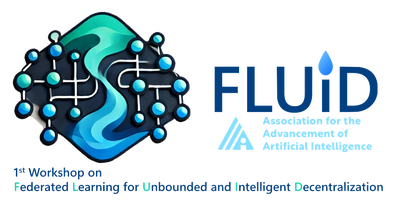We are looking for contributions on (a) enhancing federated learning (FL) scalability for decentralized AI, (b) making decentralized AI systems adaptable to non-IID data and heterogeneous device capabilities, or (c) advancing FL methodologies that enable (a) or (b). We aim to attract technical contributions that address challenges in emerging and developing sectors, with a strong emphasis on resilience and affordability. For example, high-performing FL models use limited computational resources and infrastructure, ensuring scalability and robustness across sectors like healthcare, autonomous systems, and smart cities.

Background
Federated Learning (FL) is at the forefront of decentralized AI, offering promising methods for collaborative learning without compromising data privacy. However, significant challenges remain, particularly in environments with high statistical heterogeneity (i.e., non-IID data) and device heterogeneity (i.e., varying computational capabilities and resource constraints). The FLUID workshop - Federated Learning for Unbounded and Intelligent Decentralization - seeks to explore these issues in depth, with a focus on:
• Unbounded(ness): FL systems face significant challenges in environments where data distributions and network conditions are constantly changing. How can FL systems be designed to adapt fluidly to changing environments, such as shifts in data distributions and network conditions, without centralized intervention? Addressing unbounded adaptability is crucial for maintaining performance in these decentralized, dynamic environments.
• Intelligent Decentralization: in many decentralized systems, such as autonomous vehicles or distributed industrial networks, there are critical requirements for FL models to be scalable and resilient. For example, autonomous drones gather diverse data, requiring FL models to learn and generalize effectively without a central controller, despite communication challenges. Similarly, in remote industrial facilities, FL must optimize operations and continuously update global knowledge across dispersed sites with limited connectivity. How can FL models be optimized to ensure both scalability and resilience in such dynamic, decentralized systems?
FLUID is a new workshop, but it is poised to establish itself as a key platform for advancing FL. What sets FLUID apart from other workshops is its unique focus on tackling real-world implementation challenges, particularly in highly dynamic and decentralized environments. By emphasizing practical solutions and fostering collaboration between academia and industry, FLUID is set to become an essential forum for driving the next wave of innovation in FL.
Important Dates
- 24 November 2024 Paper submissions due
09 December 202415 December 2024 Notification of paper decisions16 December 202420 December 2024Camera ready papers due- 4 March 2025 Workshop date
Acknowledgement
The organizing members from the University of Naples Federico II would like to thank the FAIR Foundation – Future Artificial Intelligence Research, a non-profit organization whose primary aim is to advance cutting-edge research in the field of artificial intelligence. FAIR is supporting the technical and logistical aspects of the workshop for the Federico II team, through initiatives funded under the National Recovery and Resilience Plan (PNRR).
